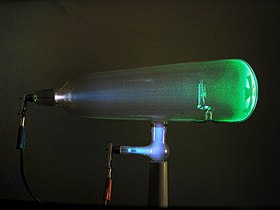ఎలక్ట్రాన్
(ఎలక్ట్రాను నుండి దారిమార్పు చెందింది)
 Experiments with a Crookes tube first demonstrated the particle nature of electrons. In this illustration, the profile of the Maltese-cross-shaped target is projected against the tube face at right by a beam of electrons.[1] | |
| కూర్పు | Elementary particle[2] |
|---|---|
| కణ గణాంకాలు | Fermionic |
| ఉత్పత్తి | First |
| Interactions | Gravity, Electromagnetic, Weak |
| చిహ్నం | Error no symbol defined, Error no symbol defined |
| వ్యతిరేక కణము | Positron (also called antielectron) |
| సైద్ధాంతీకరణ | Richard Laming (1838–1851),[3] G. Johnstone Stoney (1874) and others.[4][5] |
| ఆవిష్కరణ | J. J. Thomson (1897)[6] |
| ద్రవ్యరాశి | 9.10938291(40)×10−31 కి.g[7] 5.4857990946(22)×10−4 u[7] [1822.8884845(14)]−1 u 0.510998928(11) MeV/c2[7] |
| విద్యుదావేశం | −1 eError in {{val}}: Val parameter "el=e" is not supported −1.602176565(35)×10−19 C[7] −4.80320451(10)×10−10 [[esu]] |
| అయస్కాంత చలనం | −1.00115965218076(27) μB[7] |
| స్పిన్ | ½ |
ఎలక్ట్రాన్ అనునది పరమాణువులోని ఒక మౌలిక కణం. ఇది కేంద్రకం చుట్టూ స్థిరకక్ష్య లలో తిరుగుతుంది. ఇది ఋణ విద్యుదావేశాన్ని కలిగి ఉంటుంది. దీని ద్రవ్యరాశి ప్రోటాన్ యొక్క ద్రవ్యరాశిలో 1836 వంతు ఉంటుంది. తటస్థ పరమాణువులోని కేంద్రకం లోని ప్రోటాన్ల సంఖ్యకు ఎలక్ట్రాన్ల సంఖ్య సమానంగా ఉంటుంది. దీనిని 1897 లో జె.జె.ధామ్సన్ కనుగొన్నాడు. ఎలక్ట్రాన్ కు ఆ పేరు పెట్టిన శాస్త్ర వేత్త జి.జె.స్టనీ. దీని ఆవేశము −1.602×10−19 కులూంబులు.
ఎలక్ట్రాను అనేది అణువు లోని కేంద్రకం చుట్టూ పరిభ్రమించే పరమాణువు. ఋణాత్మక విద్యుత్ ధర్మం కలిగి వుంటుంది. దీని ద్రవ్యరాశి (mass) ప్రోటాను ద్రవ్యరాశిలో 1836 వ వంతు ఉంటుంది. ఒక అణువులో ఎన్ని ప్రోటానులు ఉంటాయో అన్ని ఎలక్ట్రానులు ఉంటాయి.
ఇవీ చూడండి
[మార్చు]మూలాలు
[మార్చు]- ↑ Dahl, P.F. (1997). Flash of the Cathode Rays: A History of J J Thomson's Electron. CRC Press. p. 72. ISBN 0-7503-0453-7.
- ↑ Eichten, E.J.; Peskin, M.E.; Peskin, M. (1983). "New Tests for Quark and Lepton Substructure". Physical Review Letters. 50 (11): 811–814. Bibcode:1983PhRvL..50..811E. doi:10.1103/PhysRevLett.50.811.
- ↑ Farrar, W.V. (1969). "Richard Laming and the Coal-Gas Industry, with His Views on the Structure of Matter". Annals of Science. 25 (3): 243–254. doi:10.1080/00033796900200141.
- ↑ Arabatzis, T. (2006). Representing Electrons: A Biographical Approach to Theoretical Entities. University of Chicago Press. pp. 70–74. ISBN 0-226-02421-0.
- ↑ Buchwald, J.Z.; Warwick, A. (2001). Histories of the Electron: The Birth of Microphysics. MIT Press. pp. 195–203. ISBN 0-262-52424-4.
- ↑ Thomson, J.J. (1897). "Cathode Rays". Philosophical Magazine. 44 (269): 293. doi:10.1080/14786449708621070.
- ↑ 7.0 7.1 7.2 7.3 7.4 P.J. Mohr, B.N. Taylor, and D.B. Newell (2011), "The 2010 CODATA Recommended Values of the Fundamental Physical Constants" (Web Version 6.0). This database was developed by J. Baker, M. Douma, and S. Kotochigova. Available: http://physics.nist.gov/constants [Thursday, 02-Jun-2011 21:00:12 EDT]. National Institute of Standards and Technology, Gaithersburg, MD 20899.
బయటి లింకులు
[మార్చు]- The NIST’s latest CODATA value for electron mass
- The Discovery of the Electron Archived 2008-03-16 at the Wayback Machine from the American Institute of Physics History Center
- Particle Data Group
- Stoney, G. Johnstone, "Of the 'Electron,' or Atom of Electricity". Philosophical Magazine. Series 5, Volume 38, p. 418-420 October 1894.
- Eric Weisstein's World of Physics: Electron
- Researchers Catch Motion of a Single Electron on Video